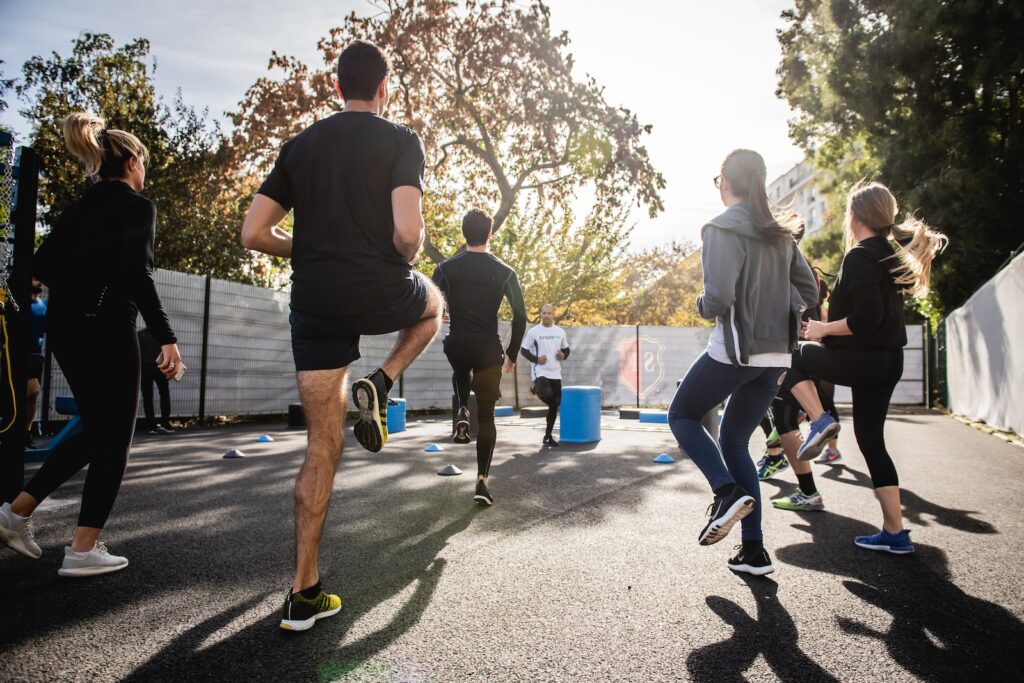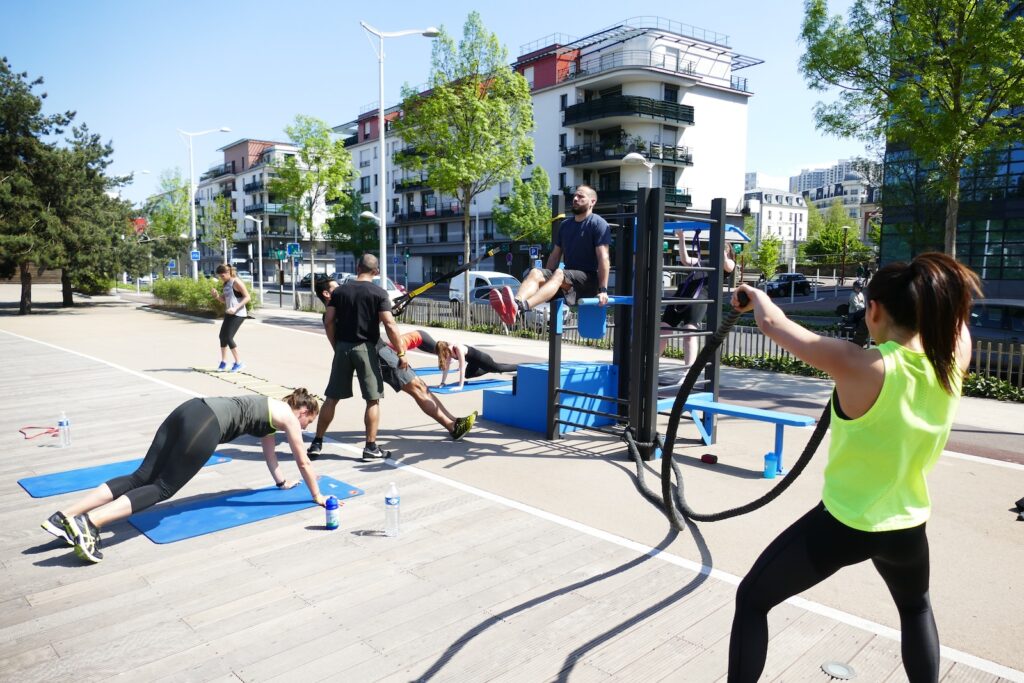
How To Start A Morning Exercise Program
Starting a morning exercise program is not very difficult. It’s pretty easy. Imagine the sun just peeking over the horizon, and the day’s hustle and bustle hasn’t yet begun. This serene moment could be the backdrop of your daily exercise routine, a time dedicated to your morning exercise program.
Why do some people find joy and energy in a morning workout while others struggle to leave the comfort of their bed? The answer lies in discipline and a deep understanding of how a morning exercise program can transform your body and entire day.
Starting a morning exercise program is more than a fitness journey; it’s how you reclaim your first waking hours and greet each day.
Whether it’s the gentle stretch of yoga or the rush of a morning run, these activities set a rhythm for the rest of your day. But how do you transition from hitting the snooze button to lacing up your sneakers? That is the right question; let’s find the right answer.
Introduction
While the world slumbers, early risers are reaping many benefits beyond physical fitness. They enjoy the advantages of embracing exercise as the first activity of their day. This post will help you create a morning exercise program. A program that resonates with your lifestyle, goals, and personal preferences. We will provide some tips and advice on starting a morning exercise program.

Starting A Morning Exercise Program
Starting a morning exercise program can be a great way to jumpstart your day and get your body moving. It can help you stay energized and motivated throughout the day and help you reach your fitness goals. However, it isn’t easy to know where to start.
Waking up to a morning exercise program isn’t just about getting fit; it’s about setting a positive tone for your day. Whether you’re looking to boost your energy, improve your health, or enjoying the early morning hours, starting a morning exercise program can be beneficial. Here’s how you can start a morning exercise program.
Set Realistic Goals When Starting A Morning Exercise Program
The first step in starting a morning exercise program is to set realistic goals. Think about what you want to achieve and how much time you can commit to exercising each morning. It’s important to set goals that you can stick to.
Starting a morning exercise program begins with setting achievable goals. Reflect on what you hope to accomplish and how much time you can dedicate each morning. If you’re new to this, start with a modest target, like 30 minutes of exercise daily. Remember, the key is consistency, not intensity.
Understanding the importance of setting realistic goals when starting a morning exercise program is crucial, especially for beginners.
Here’s why realistic goal-setting is key:
1. Prevents Overwhelm and Burnout:
- Manageable Expectations: Starting with grandiose goals can lead to feeling overwhelmed. Realistic goals are more manageable and less daunting.
- Sustainable Routine: Unrealistic goals often lead to burnout. Setting achievable targets helps in developing a sustainable exercise habit.
2. Encourages Consistency:
- Builds Habit: Smaller, realistic goals are easier to meet consistently, which is essential in habit formation.
- Progress Tracking: Achieving these goals provides a sense of progress and motivation, encouraging you to stick with the program.
3. Reduces Risk of Injury:
- Safe Progression: Jumping into intense workouts without proper conditioning can lead to injury. Realistic goals allow your body to adapt gradually.
- Acknowledges Physical Limits: It’s important to recognize and respect your body’s current limits, gradually pushing them in a safe manner.
4. Boosts Confidence and Motivation:
- Achievable Milestones: Meeting realistic goals provides a sense of achievement, boosting confidence.
- Positive Reinforcement: Each achieved goal acts as positive reinforcement, motivating you to continue.
5. Allows Personalization:
- Tailored to Individual Needs: Everyone’s fitness level and lifestyle are different. Realistic goals take into account personal starting points and constraints.
- Adaptable: As you progress, these goals can be adjusted to match your improved fitness level and aspirations.
Setting Realistic Goals:
- Start Small: Begin with goals that seem almost too easy, like a 10-minute walk or a few basic stretches.
- Gradual Increase: Slowly increase the duration and intensity of your workouts.
- Specific and Measurable: Set goals that are specific (e.g., walk for 15 minutes) and measurable (e.g., do 10 push-ups).
- Consider Lifestyle: Set goals that fit into your daily routine and consider other commitments and responsibilities.
- Seek Professional Advice: If possible, consult with a fitness professional to set appropriate goals.
Remember, the journey to fitness is personal and unique to each individual. Celebrate small victories and be patient with your progress. The key is to find joy and satisfaction in the process, not just the outcome.

Choose the Right Exercise When Starting A Morning Exercise Program
The second step is to choose the right exercise when starting a morning exercise program. The beauty of exercise lies in its variety. From the calm of yoga to the adrenaline of running, there’s something for everyone. Consider your fitness level and personal preferences. If you’re an early bird, outdoor activities like running or cycling might appeal to you.
The goal is to find something that you look forward to each morning. You may want to set an alarm to remind yourself to exercise each morning. You may also want to plan what exercise you’ll do each day. This will help you stay motivated and on track with your goals.
When starting a morning exercise program, focusing on practical, safe, and enjoyable exercises is important. The goal is to build a habit of regular physical activity without overwhelming the body.
Here are some exercise suggestions suitable for beginners:
Warm-Up (5-10 minutes)
- Dynamic Stretching: Start with gentle dynamic stretches to warm up the muscles. This can include arm circles, leg swings, and gentle torso twists.
- Walking in Place or Light Jogging: This helps increase heart rate and blood flow to the muscles, preparing your body for more intense activity.
Core Exercises (10-15 minutes)
- Plank: Begin with a 20-30-second plank to strengthen the core. As you progress, gradually increase the duration.
- Bird-Dog: This exercise improves balance and core stability. Do 10-12 repetitions on each side.
- Bicycle Crunches: A gentle way to work the oblique muscles. Aim for 10-15 repetitions on each side.
Cardio Exercises (15-20 minutes)
- Brisk Walking or Light Jogging: If you’re exercising outdoors or on a treadmill, start with a brisk walk or a light jog. Aim for a pace that slightly elevates your heart rate but allows you to converse.
- Jumping Jacks: These are great for getting your heart rate up. Start with sets of 10-15 and increase as you get more comfortable.
- Low-Impact Aerobics: Following a simple aerobics video or routine can be a fun way to get in some cardio without too much strain.
Strength Training (10-15 minutes)
- Bodyweight Squats: Start with 10-15 squats, ensuring proper form to avoid knee strain.
- Wall Push-Ups: A great way to build upper body strength without the intensity of traditional push-ups. Aim for 10-15 repetitions.
- Dumbbell Exercises: If you have light dumbbells, incorporate basic exercises like bicep curls and shoulder presses. Start with 8-10 repetitions for each exercise.
Cool Down and Stretch (5-10 minutes)
- Gentle Stretching: Focus on stretching all the major muscle groups you’ve worked on. Include stretches for your arms, legs, back, and shoulders.
- Breathing Exercises: End with deep breathing exercises to relax your body and reduce your heart rate.
Tips for Beginners:
- Listen to Your Body: Stop and adjust if something feels painful or uncomfortable. It’s important to differentiate between muscle exertion and pain.
- Stay Hydrated: Drink water before, during, and after your workout.
- Consistency Over Intensity: Focus on building a habit. Doing a moderate workout regularly is better than pushing too hard and risking injury or burnout.
- Progress Gradually: As you get stronger and more comfortable, gradually increase the intensity and duration of your workouts.
Remember, the key for beginners is to start slow and gradually build up endurance and strength. It’s also highly recommended to consult with a healthcare provider before starting any new exercise regimen, especially if there are existing health concerns.

Create a Schedule
Creating a schedule is an integral part of starting a morning exercise program. Decide when you’ll exercise each morning, and stick to it. The beauty of exercise lies in its variety. Consider your fitness level and personal preferences.
If you’re an early bird, outdoor activities like running or cycling might appeal to you. The goal is to find something that you look forward to each morning. Consistency is the backbone of any successful exercise program.
Plan your workouts, set a time, and stick to it. A morning alarm can serve as a gentle nudge to get moving. By scheduling your exercises, you’re more likely to stay committed and make them a part of your daily routine.

The Benefits of a Morning Exercise Program
1. Kickstart Your Metabolism: Doing physical activity first thing in the morning starts your metabolism. This metabolic boost means your body starts burning calories earlier in the day, aiding in weight management and energy regulation. Morning workouts can set a healthy pace for your body’s calorie-burning processes throughout the day.
2. Enhances Mental Clarity and Focus Morning exercise isn’t just a body workout; it’s a brain booster, too. Exercise increases blood flow to the brain, enhancing cognitive functions. This improves concentration, sharper focus, and problem-solving abilities throughout the day. Starting your day with a workout can mean starting your day with a clearer, more alert mind.
3. Improves Mood and Reduces Stress Physical activity triggers the release of endorphins, often known as ‘feel-good’ hormones. A morning workout routine can thus set a positive tone for the day, reducing feelings of stress and anxiety. Regular morning exercise has been linked to overall mood and mental health improvements.
4. Encourages Consistent Exercise Habits Morning workouts help establish a consistent exercise routine. Fewer scheduling conflicts early in the day make you less likely to skip your workout. This consistency is key to long-term fitness success and developing a sustainable, healthy lifestyle.
5. Better Sleep Quality Exercising in the morning can improve sleep quality at night. It helps regulate your body’s internal clock, leading to deeper, more restful sleep. Unlike evening workouts, morning exercises don’t give you that burst of energy right before bed, which can interfere with sleep.
6. Enhances Physical Performance: morning workouts can improve physical performance over time. With consistent training, your body adapts to being active earlier, potentially increasing your strength, endurance, and overall athletic ability.
7. Creates Time for Other Priorities By completing your workout in the morning, you free up time later in the day for other activities. This can lead to a more balanced lifestyle, where you can focus on work, family, and leisure without the looming thought of needing to exercise.

Find a Workout Partner
Finding a workout partner can be a great way to stay motivated and accountable. Having someone to exercise with can help you stay on track and make exercising more enjoyable. You may also want to consider joining a local gym or fitness class.
This can be a great way to meet new people and stay motivated. A workout partner can be a fantastic source of motivation. Exercising with someone makes the activity more enjoyable and keeps you accountable. Alternatively, join a local fitness class or gym to connect with like-minded individuals.
Staying hydrated is an integral part of any exercise program. Drink plenty of water before, during, and after your workout. You may also want to consider drinking a sports drink or an electrolyte-rich beverage to replenish your body’s electrolytes.
Hydration is crucial, especially when you kickstart your day with physical activity. Drink plenty of water before, during, and after your workout. A sports drink or an electrolyte-rich beverage can help replenish what you lose through sweat for intense sessions.

Reward Yourself
Rewarding yourself for sticking to your morning exercise program can be a great way to stay motivated. Set small goals and reward yourself when you reach them. For example, reward yourself with a new pair of running shoes or a massage after several workouts.
Positive reinforcement can be a powerful motivator. Set milestones and treat yourself when you hit them. It could be as simple as a new workout playlist or as indulgent as a spa day. These rewards will celebrate your commitment and excite you about your morning exercise program.
Key Takeaways
- Embrace Realistic Goals: Start with achievable targets, like a 30-minute workout, to build consistency.
- Find Joy in the Right Exercise: Choose an activity that aligns with your fitness level and interests, whether it’s yoga, running, or cycling.
- Consistency Through Scheduling: Set a specific time for your workouts and stick to it to establish a routine.
- The Power of a Workout Partner: Exercising with someone can boost motivation and make workouts more enjoyable.
- Hydration is Key: Drink plenty of water before, during, and after workouts to stay hydrated, especially for morning routines.
- Celebrate Your Progress: Reward yourself for meeting fitness milestones to maintain motivation and enjoyment.
- Transformative Morning Routine: A morning exercise program can energize your day and improve overall well-being.
Conclusion
Starting a morning exercise program can be a great way to jumpstart your day and get your body moving. It’s important to set realistic goals, choose the right exercise for you, create a schedule, find a workout partner, stay hydrated, and reward yourself for sticking to your program. With these tips, you’ll be well on your way to starting a successful morning exercise program.
Starting a morning exercise program is a step towards a healthier, more energized you. By setting realistic goals, choosing exercises you enjoy, maintaining a consistent schedule, finding companionship in your fitness journey, staying hydrated, and rewarding your progress, you’re setting yourself up for success. Embrace the journey and enjoy every step towards a fitter, happier you.
Frequently Asked Questions
Is morning exercise effective for weight loss? Yes, morning exercise can be effective for weight loss. Morning exercise kickstarts your metabolism, helping your body burn calories earlier in the day. This metabolic boost can contribute to more effective weight management with a healthy diet.
Can morning exercise improve my sleep quality? Morning exercise can positively impact sleep quality. It helps regulate your body’s circadian rhythm, leading to better sleep patterns. Unlike evening workouts, it doesn’t energize you right before bedtime, which can interfere with sleep.
What are the best types of exercises to do in the morning? You enjoy and can consistently commit to the best morning exercises. Popular choices include walking, jogging, yoga, cycling, and strength training. The key is to choose activities that suit your fitness level and preferences.
How can I motivate myself to exercise early in the morning? Motivation can be boosted by setting realistic goals, preparing your workout gear the night before, and creating a morning routine that includes exercise as a non-negotiable activity. Also, remember the positive feelings and benefits post-workout to fuel your motivation.
Does morning exercise have mental health benefits? Yes, morning exercise has significant mental health benefits. It releases endorphins and natural mood lifters, reduces stress and anxiety, and can improve overall mental well-being and resilience.
How long should a morning workout be to be effective? The effectiveness of a workout doesn’t solely depend on its duration. Even a 20-30 minute session can be beneficial. The key is consistency and ensuring the workout is appropriately intense for your fitness level.
Do I need to eat before a morning workout? This depends on your personal preference and the type of workout. For light to moderate exercise, eating beforehand may not be necessary. However, a small, easily digestible snack can provide needed energy for more intense workouts.
Can morning exercises help in building a consistent fitness routine? Yes, morning exercise can help develop a more consistent fitness routine. Mornings often have fewer scheduling conflicts, making maintaining a regular exercise habit easier.
Are there any drawbacks to exercising in the morning? The primary disadvantage is getting out of bed early, especially for those who aren’t naturally morning. It’s also important to warm up properly since muscles and joints might be stiffer in the morning.
How quickly can I see results from a morning exercise program? Results can vary based on the individual, the type of exercise, and the consistency of the routine. Generally, noticeable changes in mood and energy levels can be seen within a few weeks, while physical changes might take longer.
Here are four links that can provide additional value and information if you are interested in starting a morning exercise program:
Mayo Clinic – Exercise: 7 benefits of regular physical activity
- Mayo Clinic Exercise Benefits
- This link leads to an article by the Mayo Clinic, a renowned medical research group. It details the various benefits of regular exercise, which can reinforce the importance of a morning exercise routine.
Harvard Health Publishing – The benefits of exercise for sleep
- Harvard Health on Exercise and Sleep
- Harvard Health Publishing provides insights into how exercise, including morning routines, can significantly improve sleep quality, a key point for those considering morning workouts.
American Heart Association – Tips for Creating a Morning Workout Routine
- AHA Morning Workout Tips
- This article from the American Heart Association offers practical tips for creating and sticking to a morning workout routine, which can be highly beneficial for readers looking to start their own routine.
Psychology Today – The Psychological Benefits of Exercise
- Psychology Today on Exercise Benefits
- Psychology Today explores the mental and emotional benefits of exercise, including stress relief and improved mood, which are key advantages of a morning exercise program.
Share via:

